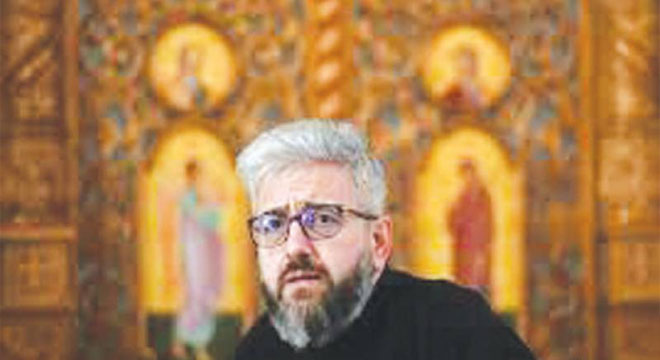ClujNapoca-When Romanian Orthodox priest Dorel Galan went public with his wish to get vaccinated against Covid-19, he was not expecting to be targeted by online trolls and anti-vaxxers.
Galan has been called “Satan’s priest”, a “disbeliever” and accused of getting paid by the state to defend vaccination.
“I was suddenly attacked by people I don’t know, by professional ‘haters’,” the 45-year-old told AFP after Sunday Mass at his church in the northern city of Cluj, dropping the English word into his Romanian. What attracted the harassment was an interview in which Galan recounted his experience of catching coronavirus.
In it, he said he was willing to be vaccinated to avoid sending others “to intensive care or to the Lord too soon through ignorance or stupidity”.
His message, together with a similar one from another priest, were also posted by the health minister as a way of convincing virus sceptics that the dangers of the illness are real. “I told worshippers that my personal decision is to get vaccinated because I trust the scientific authorities, not shamans, witchdoctors and whatnot,” says Galan.
While he does not exhort people to get vaccinated in his sermons, he tells his flock to “consult a doctor” before making a decision on the matter and to be wary of those “who take their own beliefs for scientific truths”.
In Romania, where around 86 percent of the population is Orthodox, priests very seldom speak out on sensitive matters.
Moreover, many sites targeted at Orthodox faithful have given free rein to covid denial and conspiracy theories. “The priests who betrayed Jesus no longer have the right to speak,” wrote one user.
“Of course, it’s not comfortable for me. I don’t have experience of dealing with Facebook ‘hate’ and I also never sought to be an ‘influencer’,” says the bespectacled priest with greying hair arranged in a modern cut.
But Galan decided he had to speak out after officiating over “the hardest Mass ever”, for the grandparents of a friend who both died of Covid-19
They were two among 17,600 people who have died after contracting the virus in this European country of 19 million inhabitants.
“I have nothing against those who do not want to be vaccinated and, in the same way, they should not blame me if I try to protect them against the disease,” says Galan.
Since the start of the pandemic, the influential Orthodox Church in Romania has found itself on a tightrope, negotiating with the state for the reopening of places of worship after the closure of almost two months in spring 2020.
In return for the reopening, the Church agreed to distribute to the clergy an information brochure on vaccination that stressed it was “free, safe and voluntary”.
In recent weeks there have been signs that widespread vaccine aversion may be softening in Romania, with 66 percent saying they would “certainly” or “probably” get vaccinated according to a recent study by Bucharest’s IRES institute. Despite the deal with the government, priests are under no obligation to preach the good word of the vaccine among the faithful, while the head of the Church, Patriarch Daniel, has remained silent on whether or not he will be vaccinated.
Follow the PNI Facebook page for the latest news and updates.









